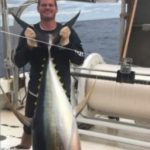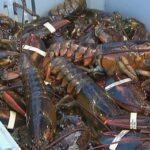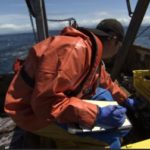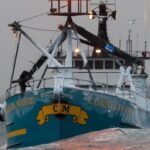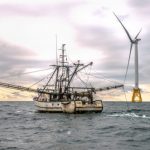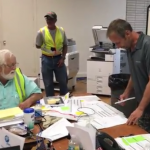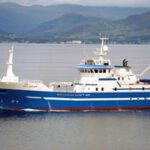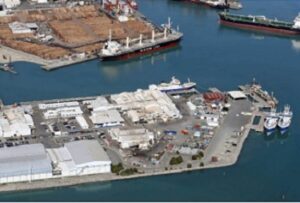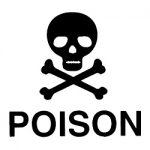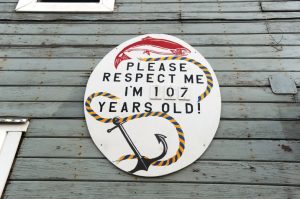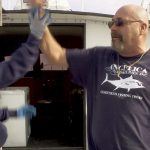Monthly Archives: August 2017
Jim Lovgren – Fishery managers responsible for Summer Flounder mismanagement
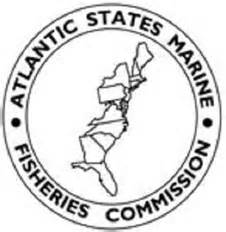 Earlier this year the state of New Jersey was found to be out of compliance by the Atlantic States Marine Fishery Commission [ASMFC] in regard to the proposed recreational catch specifications for Summer Flounder, [fluke].The ASMFC which jointly manages summer flounder with the Mid Atlantic Fishery Management Council, [MAFMC] had recommended an increase in the recreational size limit for Summer Flounder to 19 inches for New Jersey. New Jersey fishery management representatives balked at that proposal and instead presented an alternative proposal that would keep the size limit at the present 18 inches but with a shorter season which would still meet the conservation goals as the Commission’s plan. The Commission denied this alternative and declared New Jersey out of Compliance, an action that would result in the shutdown of the Summer Flounder fishery, both recreational and commercial sometime later this summer. Unfairly this shutdown would have occurred after the recreational season was over, and would only impact New Jersey’s commercial fishermen, who are already struggling with a 50% cut back in the quota over the last two years click here to read the story 11:32
Earlier this year the state of New Jersey was found to be out of compliance by the Atlantic States Marine Fishery Commission [ASMFC] in regard to the proposed recreational catch specifications for Summer Flounder, [fluke].The ASMFC which jointly manages summer flounder with the Mid Atlantic Fishery Management Council, [MAFMC] had recommended an increase in the recreational size limit for Summer Flounder to 19 inches for New Jersey. New Jersey fishery management representatives balked at that proposal and instead presented an alternative proposal that would keep the size limit at the present 18 inches but with a shorter season which would still meet the conservation goals as the Commission’s plan. The Commission denied this alternative and declared New Jersey out of Compliance, an action that would result in the shutdown of the Summer Flounder fishery, both recreational and commercial sometime later this summer. Unfairly this shutdown would have occurred after the recreational season was over, and would only impact New Jersey’s commercial fishermen, who are already struggling with a 50% cut back in the quota over the last two years click here to read the story 11:32
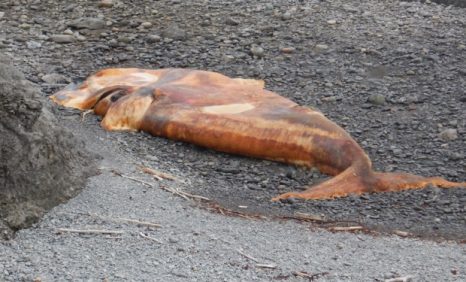
10 ‘Unprecedented:’ Another right whale carcass washes up on Newfoundland shore
Another North Atlantic right whale carcass has washed up on the west coast of Newfoundland. Four right whale carcasses have now been identified on the west coast of the province, bringing the number of dead right whales in the Gulf of St. Lawrence to 10. In a release sent Aug. 1, the Department of Fisheries and Oceans says “this is an unprecedented number of deaths and the situation is extremely concerning.” In the release, the department said the carcass was discovered south of the River of Ponds area. Its identity was confirmed after a surveillance flight. click here to read the story 11:03
Dead whale washes ashore on Rockaway Beach NJ – A dead humpback whale was found washed up on the sand along Rockaway Beach in Queens Tuesday morning, officials said. click here to read the story
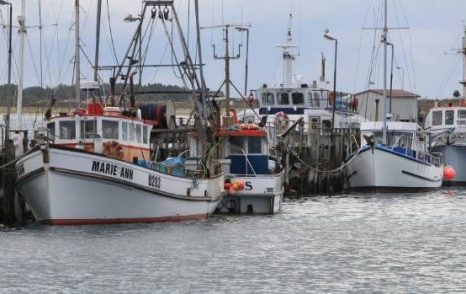
New Zealand: MPI agree to meet Southland fishermen over electronic monitoring regulations
Ministry for Primary Industries staff have agreed to front up to Southland fishermen who have questions about new monitoring and reporting regulations. From October 6, new measures will be rolled in to ensure that all commercial fishing boats are fitted with both GPS equipment and cameras, to improve monitoring of catch levels and to help prevent any illegal activity. More than 100 fishermen, from throughout Southland, met at the Ascot Park Hotel in Invercargill last week to discuss the implications of the ministry’s new Integrated Electronic Monitoring and Reporting System (IEMRS). Many in the commercial fishing industry were frustrated at the fact the new rules had been decided on without proper consultation or thought to their consequences. click here to read the story 09:43
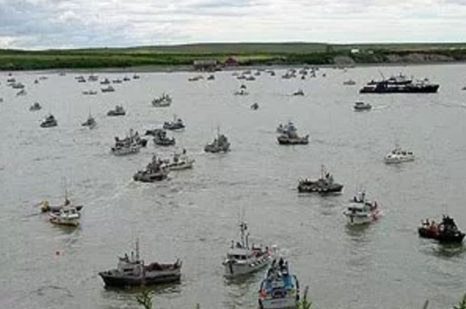
Fish-o-nomics 101
Alaska leads the nation in unemployment, and fish processors in Bristol Bay are complaining they couldn’t find the workers necessary to head, gut and in some cases further process this year’s unexpectedly large bounty of sockeye salmon. Because of this, commercial fishermen were put on limits to avoid plugging processing plants with too many salmon, which left most of them unhappy. “I personally have driven through and away (from) more fish than I’ve ever seen in my life during a legal fishing opener. And that hurts,” fisherman Larry Christensen told reporter Caitlan Tan at KDLG in Dillingham. The public radio station this year live-covered the Bristol Bay fishing season as if it were some sort of sporting event, and there are some similarities. And while fishermen were unhappy with processors, processors were unhappy with the government which they blamed for making it hard to bring in foreign workers to process fish. click here to read the story 08:48
Shrimp tales in economic swales
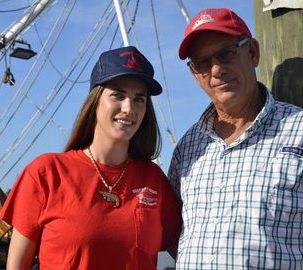 For the second time in two years, Trico Shrimp Company isn’t sailing off to Texas for the summer season. Even Erickson & Jensen, San Carlos Island’s other commercial shrimping company, stuck around an extra month before moving its operation to its Texas location in late July. It’s been more than a decade since shrimp have been plentiful just off the coast of Fort Myers Beach, but now both San Carlos Island shrimping companies are catching them by the boatful. “We’re catching phenomenal amounts right now,” said Grant Erickson, owner of Erickson & Jensen, earlier this summer. Earlier in July, one of his captains reportedly caught 150 baskets, or about 4,000 pounds, just off-shore. It’s a bit of a mystery why the shrimp have returned. click here to read the story 07:49
For the second time in two years, Trico Shrimp Company isn’t sailing off to Texas for the summer season. Even Erickson & Jensen, San Carlos Island’s other commercial shrimping company, stuck around an extra month before moving its operation to its Texas location in late July. It’s been more than a decade since shrimp have been plentiful just off the coast of Fort Myers Beach, but now both San Carlos Island shrimping companies are catching them by the boatful. “We’re catching phenomenal amounts right now,” said Grant Erickson, owner of Erickson & Jensen, earlier this summer. Earlier in July, one of his captains reportedly caught 150 baskets, or about 4,000 pounds, just off-shore. It’s a bit of a mystery why the shrimp have returned. click here to read the story 07:49
No new rules for declining southern New England lobstering
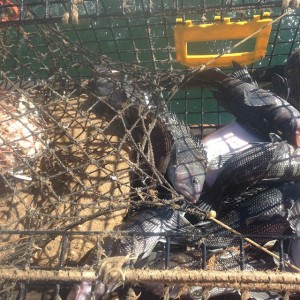 An interstate panel that manages fisheries voted on Tuesday against a plan to try to preserve the declining southern New England lobster population with new fishing restrictions.The New England lobster fishery is based largely in Maine, where the catch has soared to new heights in recent years. But the population has collapsed off Connecticut, Rhode Island, southern Massachusetts and New York’s Long Island as waters have warmed in those areas. An arm of the Atlantic States Marine Fisheries Commission considered a host of new restrictions about lobster fishing in southern New England on Tuesday and chose to shoot the plan down.,, “It’s time to think a little differently about how we are managing lobsters in southern New England,” board member Peter Burns said. “We know there are things we can do,” (it was a lively discussion!) click here to read the story 18:38
An interstate panel that manages fisheries voted on Tuesday against a plan to try to preserve the declining southern New England lobster population with new fishing restrictions.The New England lobster fishery is based largely in Maine, where the catch has soared to new heights in recent years. But the population has collapsed off Connecticut, Rhode Island, southern Massachusetts and New York’s Long Island as waters have warmed in those areas. An arm of the Atlantic States Marine Fisheries Commission considered a host of new restrictions about lobster fishing in southern New England on Tuesday and chose to shoot the plan down.,, “It’s time to think a little differently about how we are managing lobsters in southern New England,” board member Peter Burns said. “We know there are things we can do,” (it was a lively discussion!) click here to read the story 18:38
Coast Guard medevacs 43-year-old fisherman 25-miles south of Shinnecock Inlet
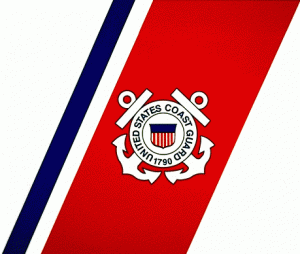 The Coast Guard medevaced a 43-year-old man from a fishing vessel 25-miles south of Shinnecock Inlet, New York, Tuesday. Coast Guard Sector Long Island Sound watchstanders received a notification at 1:50 a.m., of a crewmember aboard a fishing vessel (F/V Ashton Matthew) who was suffering from shortness of breath and tightening in his chest. A Coast Guard Station Shinnecock 47-foot Motor Life Boat (MLB) crew got underway at 2:30 a.m., and arrived on scene less than an hour later. Members of the boat crew brought the 43-year-old man from the fishing vessel aboard the Coast Guard MLB, then transported him to Station Shinnecock where he was then safely transferred to a local EMS crew. -USCG-18:11
The Coast Guard medevaced a 43-year-old man from a fishing vessel 25-miles south of Shinnecock Inlet, New York, Tuesday. Coast Guard Sector Long Island Sound watchstanders received a notification at 1:50 a.m., of a crewmember aboard a fishing vessel (F/V Ashton Matthew) who was suffering from shortness of breath and tightening in his chest. A Coast Guard Station Shinnecock 47-foot Motor Life Boat (MLB) crew got underway at 2:30 a.m., and arrived on scene less than an hour later. Members of the boat crew brought the 43-year-old man from the fishing vessel aboard the Coast Guard MLB, then transported him to Station Shinnecock where he was then safely transferred to a local EMS crew. -USCG-18:11
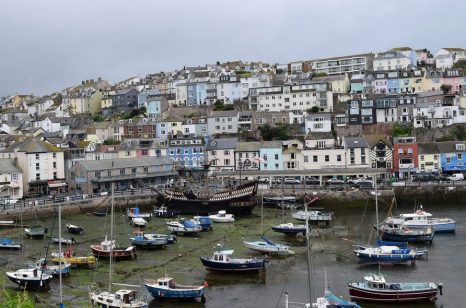
Brexit Hopes Fade for Some Who Want It So Badly
The faded Welsh industrial port of Milford Haven and the picturesque English harbor town of Brixham are economic worlds apart, but they’re both desperate to leave the European Union. Locals say Brexit can boost their fishing industry, hit by competition from foreign fleets and quotas on catches during 44 years of EU membership. The worry is that the country will repeat the mistakes on the way out they say were made on the way in by ceding to too many European demands. What they don’t want is to end up with access to more fish, though fewer markets. “There’s a lot of bargaining and we need to come down hard and do something about it,” said Mark Albery, 43, who catches lobster, crab and whelk in the waters off Milford Haven on Wales’s southwestern tip. A fisherman since he was a teenager, he’s not optimistic over a favorable deal. “Not with this country, no, not at all. We just do what we’re told in the end.” click here to read the story 15:32
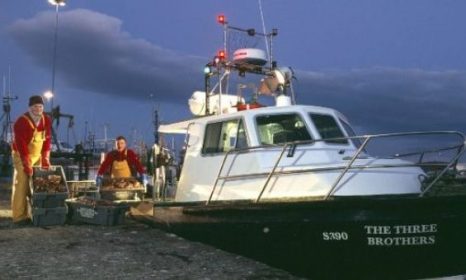
The Kings of Crab from Castletownbere – The Shellfish Ireland Story
It’s 1987 and sitting in a kitchen in the small town of Castletownbere in the west of Cork, two young friends with a keen interest in fishing founded what would later become Shellfish Ireland. Friends Richard Murphy and Peter O’Sullivan combined their love of fishing and worked together to catch and supply brown crab to local seafood buyers. As the years progressed, Shellfish Ireland grew to become a respectable and reliable seafood producer. Speaking to co-founder Richard, he fondly recalls the beginnings of the company, “Shellfish Ireland first began in 1987 in my father’s kitchen. I used go fishing with my friend Peter in the mornings, cooking and process the catch in the afternoon and then delivering to our customers that evening. They were long days full of hard work, but we enjoyed the challenge.” Enjoying the challenge would prove successful for the determined Castletownbere duo, who recognised a gap in the local market. click here to read the story 12:14
Hiring seafood workers in Bristol Bay has been tough for years. This summer, it’s worse.
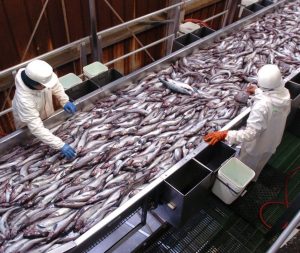 Seafood processors in Alaska’s Bristol Bay this summer have had trouble finding enough workers to handle the fish that come through their plants. Those in the industry say a confluence of factors, including a lack of visas for bringing foreign workers to the industry, a hotter economy in the Lower 48, and a record-breaking salmon run in Bristol Bay, was to blame. “There was a significant lack of process workers for some companies in the bay, and it exacerbated the problems of having to deal with high levels of harvest,” said John Garner, president of Seattle-based North Pacific Seafoods, which has locations across Alaska. Some processors couldn’t keep up with the huge amount of fish coming in, which forced them to resort to whatever method was fastest to get the pounds through the plant. click here to read the story 10:03
Seafood processors in Alaska’s Bristol Bay this summer have had trouble finding enough workers to handle the fish that come through their plants. Those in the industry say a confluence of factors, including a lack of visas for bringing foreign workers to the industry, a hotter economy in the Lower 48, and a record-breaking salmon run in Bristol Bay, was to blame. “There was a significant lack of process workers for some companies in the bay, and it exacerbated the problems of having to deal with high levels of harvest,” said John Garner, president of Seattle-based North Pacific Seafoods, which has locations across Alaska. Some processors couldn’t keep up with the huge amount of fish coming in, which forced them to resort to whatever method was fastest to get the pounds through the plant. click here to read the story 10:03
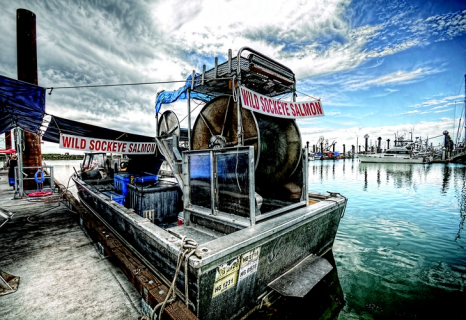
B.C. fishermen facing limited or no openings for sockeye
Commercial fishermen in B.C. won’t be getting many – if any – opportunities to harvest sockeye salmon this year, though they may be able to at least net some pink salmon. This year’s Fraser River sockeye return is expected to be low, based on historical patterns, and the early signs are that they are coming in even lower than forecast. Nass and Skeena River sockeye aren’t doing any better. The only runs that seem to be doing relatively well are Somass River sockeye and Central Coast chum salmon. No commercial opening had been expected for Somass sockeye, but returns were strong enough to allow for a small opening for seine and gillnet fisheries. click here to read the story 09:05
‘Unreasonable delay,’ – FISH-NL urges Labour Board to call immediate vote for fishermen to choose their union
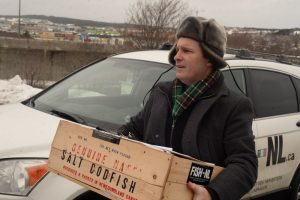 FOR IMMEDIATE RELEASE Aug. 1st, 2017 The Federation of Independent Sea Harvesters of Newfoundland and Labrador (FISH-NL) is calling on the province’s Labour Relations Board to conduct an immediate vote of inshore harvesters to decide which union they want to represent them. “It’s been seven months since FISH-NL presented our application for certification to the board with no end in sight,” says Ryan Cleary, President of FISH-NL. “The delay is unreasonable, given that time is of the essence.” On Dec. 30th, 2016, FISH-NL presented an application to the province’s Labour Relations Board requesting the new union be certified as the bargaining agent for inshore fish harvesters, currently represented by the FFAW-Unifor.,,, While FISH-NL and the FFAW-Unifor supplied information to the Labour Relations Board in response to the order, Derek Butler President of ASP, refused. click here to read the press release 07:56
FOR IMMEDIATE RELEASE Aug. 1st, 2017 The Federation of Independent Sea Harvesters of Newfoundland and Labrador (FISH-NL) is calling on the province’s Labour Relations Board to conduct an immediate vote of inshore harvesters to decide which union they want to represent them. “It’s been seven months since FISH-NL presented our application for certification to the board with no end in sight,” says Ryan Cleary, President of FISH-NL. “The delay is unreasonable, given that time is of the essence.” On Dec. 30th, 2016, FISH-NL presented an application to the province’s Labour Relations Board requesting the new union be certified as the bargaining agent for inshore fish harvesters, currently represented by the FFAW-Unifor.,,, While FISH-NL and the FFAW-Unifor supplied information to the Labour Relations Board in response to the order, Derek Butler President of ASP, refused. click here to read the press release 07:56




































